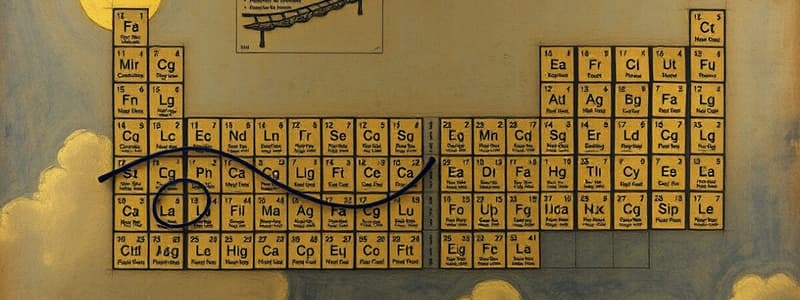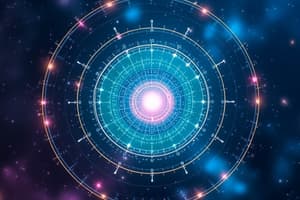Podcast
Questions and Answers
Which of the following elements is a noble gas that does not combine with itself?
Which of the following elements is a noble gas that does not combine with itself?
- Argon (Ar) (correct)
- Chlorine (Cl)
- Boron (B)
- Oxygen (O)
What is the symbol for potassium, which has a Latin-derived name?
What is the symbol for potassium, which has a Latin-derived name?
- Pd
- Po
- P
- K (correct)
Which of the following correctly describes hyperkalemia?
Which of the following correctly describes hyperkalemia?
- Too little sodium in the blood
- Too much potassium in the blood (correct)
- Too much sodium in the blood
- Too little potassium in the blood
How are elements with similar chemical properties arranged in the periodic table?
How are elements with similar chemical properties arranged in the periodic table?
What is the condition called when there is too little sodium in the blood?
What is the condition called when there is too little sodium in the blood?
Which of the following elements is identified by a symbol that is not made up of its first letters?
Which of the following elements is identified by a symbol that is not made up of its first letters?
What common characteristic do noble gases share regarding their reactivity?
What common characteristic do noble gases share regarding their reactivity?
Which element is represented by the symbol 'Cl'?
Which element is represented by the symbol 'Cl'?
What represents the spin states of electrons in orbital diagrams?
What represents the spin states of electrons in orbital diagrams?
How does an atom achieve its lowest energy configuration?
How does an atom achieve its lowest energy configuration?
For the nitrogen atom, how many protons and electrons does it have?
For the nitrogen atom, how many protons and electrons does it have?
Which orbital is filled first in the nitrogen atom's electron configuration?
Which orbital is filled first in the nitrogen atom's electron configuration?
What is indicated by filling the 2p orbital with three electrons in nitrogen?
What is indicated by filling the 2p orbital with three electrons in nitrogen?
What charge is assigned to nitrogen due to its electrons?
What charge is assigned to nitrogen due to its electrons?
Why do electrons fill the orbitals like a parking garage?
Why do electrons fill the orbitals like a parking garage?
How many total electrons does a neutral nitrogen atom have?
How many total electrons does a neutral nitrogen atom have?
What is the valence of sodium after it loses an electron?
What is the valence of sodium after it loses an electron?
Which group in the periodic table typically gives away one electron to achieve stability?
Which group in the periodic table typically gives away one electron to achieve stability?
What is the primary reason halogens are highly reactive?
What is the primary reason halogens are highly reactive?
How many electrons do magnesium and calcium want to give away to achieve stability?
How many electrons do magnesium and calcium want to give away to achieve stability?
What does the presence of an 'open parking spot' in an orbital indicate?
What does the presence of an 'open parking spot' in an orbital indicate?
Which of the following correctly describes the ionization of magnesium?
Which of the following correctly describes the ionization of magnesium?
What is the valence charge of calcium when it is ionized?
What is the valence charge of calcium when it is ionized?
Which element listed below belongs to Group 1 and typically wants to give away one electron?
Which element listed below belongs to Group 1 and typically wants to give away one electron?
Which pH value represents a neutral solution?
Which pH value represents a neutral solution?
What type of acid releases all its hydrogen ions in water?
What type of acid releases all its hydrogen ions in water?
What is the approximate pH of stomach acid?
What is the approximate pH of stomach acid?
What pH value is associated with blood?
What pH value is associated with blood?
Which of the following substances has the highest pH?
Which of the following substances has the highest pH?
How do weak acids function in the body?
How do weak acids function in the body?
What is the pH range of vaginal fluid?
What is the pH range of vaginal fluid?
What reaction occurs when strong bases dissociate in water?
What reaction occurs when strong bases dissociate in water?
What structure is formed around a polyatomic ion such as SO42– in solution?
What structure is formed around a polyatomic ion such as SO42– in solution?
Which of the following small molecules is highly soluble in water due to its ability to form hydrogen bonds?
Which of the following small molecules is highly soluble in water due to its ability to form hydrogen bonds?
What effect does a colloid have on visible light?
What effect does a colloid have on visible light?
What primarily determines the solubility of a small molecule in water?
What primarily determines the solubility of a small molecule in water?
What is the composition of oleic acid that limits its solubility in water?
What is the composition of oleic acid that limits its solubility in water?
Which type of mixture is formed when particles are the size of cells in a salt solution?
Which type of mixture is formed when particles are the size of cells in a salt solution?
What type of solution does table sugar appear to be when dissolved in water?
What type of solution does table sugar appear to be when dissolved in water?
What happens to red and white blood cells when blood is centrifuged?
What happens to red and white blood cells when blood is centrifuged?
Flashcards are hidden until you start studying
Study Notes
Electron Configuration and Orbital Diagrams
- Spin states of electrons in orbital diagrams are represented as "up arrows" (↑) and "down arrows" (↓).
- Atoms achieve their most stable, lowest energy state by filling orbitals from lowest to highest energy.
- A nitrogen atom has 7 electrons, filling the 1s and 2s orbitals before populating the 2p orbital.
- Nitrogen’s electron configuration includes 2 electrons in the 1s orbital, 2 in the 2s, and 3 in the 2p orbital, leading to a valence of -3.
Noble Gases and Chemical Properties
- Noble gases, like argon, do not combine with other elements and are not present in the human body.
- Elements’ symbols usually derive from the first letters of their names, with exceptions like Na (sodium), K (potassium), and Fe (iron) due to their Latin origins.
- Understanding orbital diagrams helps predict an element's chemical behavior and stability based on electron arrangements.
Group Trends in the Periodic Table
- Group 1 elements (H, Li, Na, K) typically have one electron to lose, contributing to a valence of +1.
- Group 17 elements (halogens) are highly reactive as they tend to gain an electron to achieve stability, leaving one open spot in their orbitals.
- Groups 2 elements (Mg, Ca) each have a valence of +2, as they lose two electrons to achieve a stable configuration.
pH Scale and Acids/Bases
- pH indicates hydrogen ion concentration, with strong acids having pH values near zero and weak acids like citric acid (pH 2) being partially dissociated in water.
- Pure water has a neutral pH of 7; blood is slightly basic at pH 7.4.
- Common household substances have varied pH levels: baking soda (pH 8.3), bleach (pH 12.6), and lye (pH 14).
Acid-Base Reactions and Ionic Dissociation
- Strong acids dissociate completely in water, while weak acids like stomach acid (pH 2-3) do so partially, contributing to digestive processes.
- Strong bases like NaOH dissociate in water to yield Na+ and OH− ions, which can accept hydrogen ions to form water.
Hydration Shells and Solubility
- The hydration shell forms around ions or molecules capable of hydrogen bonding, enhancing their solubility in water.
- Table sugar (sucrose) can form hydrogen bonds due to its multiple oxygen atoms, making it highly soluble, while oleic acid has limited hydrogen bonding capability, leading to lower solubility.
Colloids, Suspensions, and Blood
- Colloids, like milk, contain larger molecules capable of scattering light, leading to a cloudy appearance.
- Suspensions consist of particles large enough to be separated by centrifugation, such as blood, which separates into cells and plasma when processed.
Studying That Suits You
Use AI to generate personalized quizzes and flashcards to suit your learning preferences.




